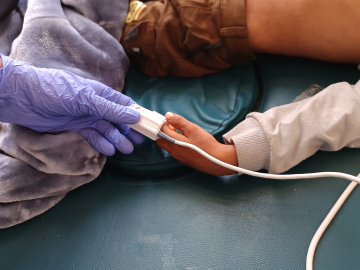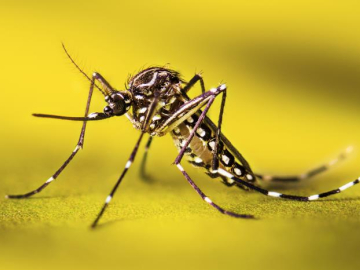Africa’s Decision-Makers Get a Data Boost
More than 2 thirds of people in Africa say they wouldn’t have enough food and water if they had to endure a 2-week quarantine, a third say they don’t have enough information about the coronavirus and how it spreads, and more than half believe COVID-19 can be prevented by lemon and vitamin C.
These findings, from a new report (Responding to COVID-19 in Africa: Using Data to Find a Balance), help fill in critical gaps on the knowledge, acceptance, impact and effectiveness of public health and social measures to combat COVID-19 in Africa.
Across the continent, early action to block COVID-19 from many countries—including some that locked down before a single case appeared—likely helped slow transmission across the continent. But policymakers know that cases are likely higher than official counts, amid recent reports that some parts of Africa are already seeing cases rise exponentially. Transmissions will almost certainly increase rapidly, and tough choices are likely ahead.
As Africa prepares for a long-term response,“we must apply lessons from the past, and we must also use evidence to drive decision-making so we can recommend the most effective and responsible policies,” said John Nkengasong, PhD, head of the Africa CDC, at a media briefing ahead of the report’s release on Tuesday.
The first-of-its-kind effort was led by the Partnership for Evidence-based Response to COVID-19—a public-private partnership formed by members of the World Economic Forum COVID Action Platform, including Vital Strategies, the Africa CDC, the WHO, and Ipsos. They polled nearly 21,000 people in 20 African member states between March 29 to April 4, focusing on large, vulnerable population centers—including 28 cities in 4 regions.
Some key takeaways:
- Respondents report near-universal—98%—awareness of COVID-19.
- 62% believe COVID-19 will have a major impact on their country—but only 44% feel personally threatened.
- 69% expressed concern about having enough to eat or drink during prolonged quarantines; 51% said they’d run out of money.
Already, hunger in urban centers in Nigeria and Kenya is forcing people to violate stay-at-home orders to search for food, according to the report.
“Large information gaps on COVID-19 exist in Africa and threaten response efforts,” says Matshidiso Moeti, MBBS, MSc, regional director of WHO’s Regional Office for Africa. “Evidence-informed data is needed to save lives and protect livelihoods.”
To fill in those gaps, better data is needed about everything from attitudes, to mobility, to symptoms, to tests, to deaths, says former US CDC director Tom Frieden, MD, MPH, president and CEO of Resolve to Save Lives, an initiative of Vital Strategies.
He urges policymakers weighing measures that could save lives but disrupt livelihoods, to reject “bold dichotomies”— the idea that approaches must be “open vs. closed; public health versus economic; us vs. them.”
Instead, he advises, “Think of it as a dial, rather than an on/off switch”—but make sure those tough decisions are driven by good data.
He pointed out some potentially protective factors for Africa—such as its relatively young population, as COVID-19 is generally hitting older people harder. Only 3% of sub-Saharan Africa’s population is 65 years or older, according to the report.
Still, there are many people with underlying vulnerabilities, and that’s particularly troubling for low- and middle- income countries—where social safety nets are thin and health workers were scarce even before COVID-19, Frieden notes. It will be critical to protect them.
Another stress point: The need to isolate people who are sick. In 12 of 20 states, fewer than half of survey respondents report having a separate room to isolate a sick family member. Governments need to consider all of these challenges to reduce transmission.
“The virus spreads through a web,” Frieden says, “We need to disrupt as many connections to the web as possible.”
The report shows strong acceptance of many physical distancing measures, Amanda McClelland, MPH, MBA, senior vice president of the Prevent Epidemics team at Vital Strategies, told GHN in a separate interview. She pointed to encouraging acceptance of the need to suspend mass gatherings like sporting and entertainment events—and religious services. “But the barriers are going to become a problem the longer restrictions remain in place,” she says—something for governments to think about as they face mounting pressure to loosen lockdown measures, ensure the protection of health workers, and address food insecurity.
A COVID-19 caseloads grow and restrictions are imposed, the number of related security incidents has increased, too, according to PERC’s analysis.
The report sets out 3 major recommendations:
- Strengthen public health systems for immediate response and for a lasting recovery; building public health capacity to test, trace, isolate, and treat cases
- Monitor data on how public health measures meet local COVID-19 conditions and needs
- Engage communities to adapt PHSM to the local context, communicate effectively about risks, and shield vulnerable populations
People queued up to board a bus on April 20, 2020, in Nketa township, Bulawayo, Zimbabwe. Image: Zinyange Auntony/AFP/Getty





